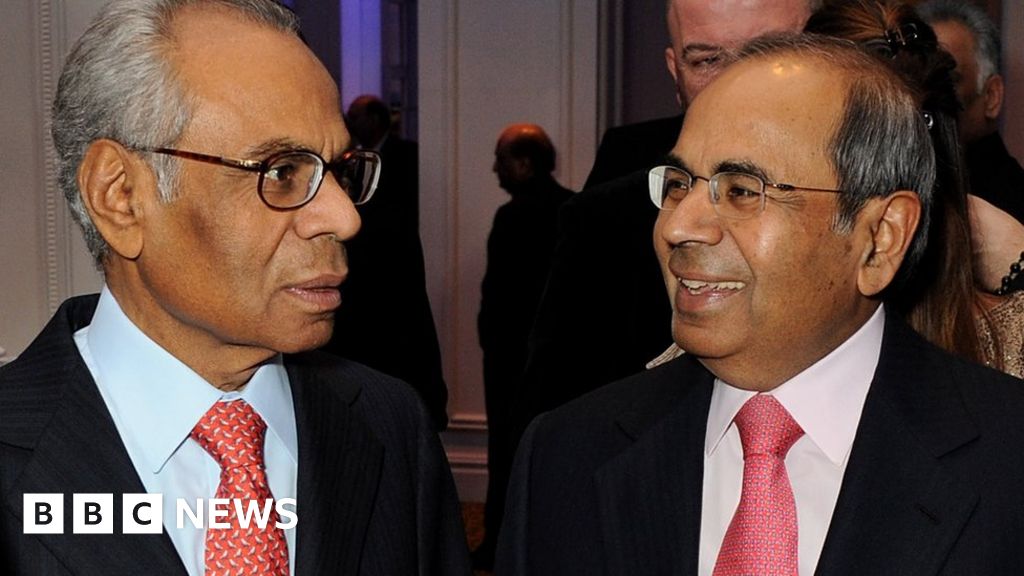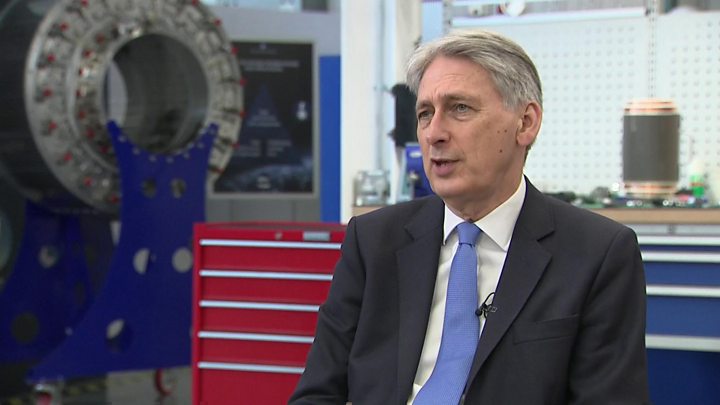
The billionaire Hinduja brothers have been named as the wealthiest people in the UK for a third time, according to the Sunday Times Rich List.
Sri and Gopi Hinduja saw their fortune increase by £1.356bn in the last year to £22bn, the paper estimates.
Meanwhile, chemicals firm founder Sir Jim Ratcliffe, who topped last year's list, has slipped to third place.
And Valerie Moran becomes the first black female entrepreneur ever to make the paper's Rich List.
Family business the Hinduja Group was founded in Mumbai in 1914, and now has interests around the world including in oil and gas, banking, IT and property.
British citizens Sri, 83, and Gopi, 79, who are based in London, are two of the four brothers controlling the empire.
Among the properties they own is the Old War Office in Whitehall, which they hope to reopen as a luxury hotel.
The two brothers topped the newspaper list in 2014 and in 2017.
The Sunday Times Rich List 2019 (Top 10)
- Sri and Gopi Hinduja (Industry and finance) | £22bn
- David and Simon Reuben (Property and internet) | £18.7bn
- Sir Jim Ratcliffe (Chemicals) | £18.2bn
- Sir Len Blavatnik (Investment, music and media) | £14.4bn
- Sir James Dyson and family (Household goods and technology) | £12.6bn
- Kirsten and Jorn Rausing (Inheritance and investment) | £12.3bn
- Charlene de Carvalho-Heineken (Inheritance, brewing and banking) | £12bn
- Alisher Usmanov (Mining and investment) | £11.3bn
- Roman Abramovich (Oil and industry) | £11.2bn
- Mikhail Fridman (Industry) | £10.9bn
The list, which estimates the 1,000 richest people in the UK, is based on identifiable wealth including land, property, other assets such as art, and shares in companies, the Sunday Times says. It does not include the amount contained in people's bank accounts.
Brothers David and Simon Reuben - who made their fortune in property, carpets and scrap metal - are in second place on the list, with a combined wealth of £18.664bn.
Meanwhile, the richest person on last year's list, Sir Jim Ratcliffe, who founded the Ineos chemicals firm, saw his net worth drop by £2.9bn since last year, the paper says.
Inventor Sir James Dyson - who campaigned for Brexit and has announced he would be relocating his company headquarters to Singapore - comes in at fifth on the list, up from 12th last year.
Zimbabwe-born Ms Moran is the first black female entrepreneur on the Rich List, ranking joint 970th alongside her husband, Noel. The couple, whose combined fortune is estimated at £122m, have a 81.5% stake in financial technology company Prepaid Financial Services.
Kirsten Rausing, part of the Rausing family which was behind the Tetra Pak drinks carton empire, is the highest ranked woman on the list. She appears alongside her brother Jorn Rausing in sixth place, with a combined estimated wealth of £12.256bn.
Meanwhile, Sir Philip Green and his wife Tina are placed at 156th on the list, down from 66th last year.
His fortune has been estimated at £950m - the first time in 17 years that Sir Philip has not been listed as a billionaire.
Sir Philip's company, The Arcadia Group, has been coping with a pensions deficit.
Robert Watts, who compiled this year's list, said: "On the face of it this looks like a bumper year for the super-rich, with record wealth, more billionaires and the entry level rising to £120m.
"But many of the rich are nursing big losses after a year of turbulence on the stock market and political deadlock in Westminster.
"Technology is making and breaking fortunes. We are finding young entrepreneurs making vast sums of money from online fashion retail, dating apps and creating YouTube videos."
He added that online shopping "continues to have a profound effect" on UK high streets, adding that well known retailers "are seeing their fortunes smashed by this seismic change".
For the sixth year in a row, Scotland's richest person was named as Glenn Gordon and his family, the Jersey-based tycoon behind distillers William Grant & Sons. The group produces whisky including Grant's, Glenfiddich and The Balvenie, as well as Hendrick's gin.
And Cardiff-born venture capitalist Sir Michael Moritz remains Wales' richest person with a £3bn fortune.
The richest sports star aged 30 or under was named as Northern Irish golfer Rory McIlroy.
Meanwhile, top of the Music Rich List in the UK - which includes writers and performers - is Andrew Lloyd Webber with a fortune of £820m.
Musician Ed Sheeran doubled his wealth last year, while grime artist Stormzy made his debut on the rich list of young musicians with £16m.
https://www.bbc.com/news/uk-48240853
2019-05-12 02:36:18Z
CBMiJGh0dHBzOi8vd3d3LmJiYy5jb20vbmV3cy91ay00ODI0MDg1M9IBAA

